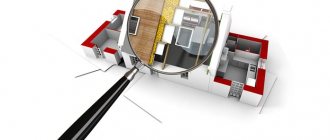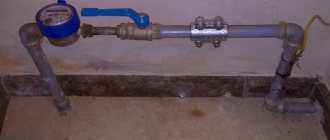Author's rating
Author of the article
Yulia Kuprina
Certified lawyer. Total work experience in the specialty is 13 years.
Articles written
23
about the author
With apartment meters, utility bills are usually lower. However, it is not possible to install water meters everywhere and not always. In this article we will talk about what the lack of technical ability to install metering devices is, what kind of document is drawn up and why it is drawn up.
Normative base
If there are meters, the fee is calculated based on the recorded consumption multiplied by the tariff. The tariff is approved by the authority of the constituent entity of the Russian Federation, that is, it is different in each region.
If there is no meter, the fee will be calculated based on the requirements of clause 42 of the rules approved by Decree of the Government of the Russian Federation dated May 6, 2011 No. 354 (Rules 354). That is, not according to indications, but based on the standard, taking into account the increasing coefficient. The standards are approved by a separate regulatory act for each resource separately in each region.
The increasing coefficient is also prescribed in Rules 354 (formula 23(1)). When calculating according to standards in the absence of communal, individual or common apartment meters installed in 2021, the coefficient was equal to 1.4.
Since 2021, the coefficient has increased and is now 1.5. For example, if the standard per person is 100 kW of electricity, then you will have to pay not for 100, but for the 150 kW consumed.
However, there are situations when it is not possible to install a meter. In this case, in order to reduce the financial burden, the consumer will need to obtain a document stating the impossibility of its installation.
The main document regulating the issue of the admissibility of installing water meters (meters) is Order of the Ministry of Regional Development of the Russian Federation (Ministry of Regional Development of Russia) dated December 29, 2011 No. 627.
Paragraph 81 of Rule 354 states that the criteria for the possibility (impossibility) of installing devices must be determined by the Ministry of Construction and Housing and Communal Services. However, the version of the same Rules 354, valid until 2014, delegated this authority to the Ministry of Regional Development. Therefore, this issue is now regulated by the order of this department dated December 29, 2011 No. 627.
Blog
Photo source: https://www.pexels.com/
Disputes with resource supply organizations have long become an integral part of the work of management companies. In this article we will talk about settlements with heat supply organizations if the house does not have an ODPU.
The procedure for determining the volume of utility services in settlements with resource supplying organizations is established by the “Rules that are mandatory when concluding contracts for the supply of utility resources for the purposes of providing utility services, approved by Decree of the Government of the Russian Federation of February 14, 2012 No. 124” (hereinafter referred to as Rules 124).
In accordance with paragraphs. “e” clause 22 of these Rules, if there is an obligation and technical ability to install a collective
(general building)
heat energy metering device, the cost of thermal energy supplied to an apartment building that is not equipped with such a metering device is determined based on the consumption standard for the
heating utility service and the total area of residential and non-residential premises in the apartment building
using a multiplying factor
, the value of which is set in size
equal to 1.1.
This coefficient is not applied if there is an inspection report to determine the presence (absence) of the technical feasibility of installing a collective (common house) utility metering device,
confirming the lack of technical feasibility of installing such a metering device
, starting from the billing period in which such an act was drawn up.
Therefore, in order for the management organization to avoid additional costs in the form of an increasing factor, it is necessary to draw up a report stating that it is not technically possible to install the ODPU.
As a rule, such an act is drawn up by representatives of the RSO and the management organization together with the owners of the apartment building premises.
By Order of the Ministry of Regional Development of Russia dated December 29, 2011 No. 627
“On approval of the criteria for the presence (absence) of the technical possibility of installing individual, common (apartment), collective (common house) metering devices, as well as the form of the survey report to determine the presence (absence) of the technical possibility of installing such metering devices and the procedure for filling it out" (hereinafter — Order of the Ministry of Regional Development 627),
approved: criteria for the presence (absence) of the technical possibility of installing
individual, common (apartment), collective (common house)
metering devices
;
form of an inspection report
to determine the presence (absence) of the technical feasibility of installing metering devices
;
the procedure for filling out an inspection report to determine the presence (absence) of the technical feasibility of installing metering devices.
From the contents of Order of the Ministry of Regional Development 627 it follows that the installation of energy consumption meters is impossible if:
- this requires reconstruction, major repairs or the creation of new in-house engineering systems;
- when installing a metering device of the corresponding type, it is impossible to ensure compliance with the mandatory metrological and technical requirements for the metering device, the place and procedure for its installation;
- at the installation site of the metering device it is impossible to meet the requirements for its operating conditions (
including due to the technical condition and (or) operating mode of in-house engineering systems (in-house equipment), temperature conditions, humidity, electromagnetic interference, flooding of premises, and (or) it is impossible to provide access to take readings from a meter of the appropriate type and its maintenance , replacements)
; - if the MKD
has a vertical distribution of intra-house engineering heating systems
(
except for MKD, for which
the Federal Law of November 23, 2009 No. 261-FZ “On energy saving and increasing energy efficiency and on introducing amendments to certain legislative acts of the Russian Federation”
establishes a requirement for their equipped with metering devices at the time of their commissioning
).
As stated in Appendix 1 to Order of the Ministry of Regional Development 627, the technical feasibility of installing a metering device of the appropriate type in an apartment building
(residential building or premises),
is available if, during the inspection of
the technical feasibility of installing a metering device of the appropriate type,
the absence of the above criteria is established
.
Thus, in the absence of an inspection report with a conclusion that it is not technically possible to install an ODPU, setting an increasing coefficient for the management organization by the RSO is legal.
As stated in the Letter of the Ministry of Construction, Letter of the Ministry of Construction and Housing and Communal Services of the Russian Federation dated June 2, 2021 No. 19506-00/04 “On the application of increasing coefficients when paying the cost of thermal energy,” the increasing coefficient does not increase the volume of utilities sold. The use of an increasing coefficient when calculating the volume of utility services is a measure aimed at stimulating consumers of utility services to install, timely repair and replace metering devices used in payments for utility services (Part 2 of Article 13 of the Federal Law). In the absence of a collective (general house) heat energy meter, if it is technically possible to install it, the resource supplying organization applies an increasing factor of 1.1 to the amount of the heating fee billed to the management organization.
At the same time, the application of an increasing coefficient to the amount of heating payments to utility consumers is not provided.
This position is confirmed by established judicial practice:
In the Resolution of the Seventeenth Arbitration Court of Appeal dated April 4, 2018, the court satisfied the demands of Nizhny Tagil Heating Networks to collect debt for thermal energy using an increasing factor. Declaring that it was not technically possible to install a common house meter in a number of apartment buildings, it did not provide relevant evidence and did not document this circumstance.
In the Resolution of the Ninth Arbitration Court of Appeal dated November 24, 2021 in case No. A40-20967/2017, satisfying the requirements of the heat supply organization due to the lack of an inspection report to determine the presence (absence) of the technical feasibility of installing an ODPU, the court also indicated that, according to subparagraph “ e"
paragraph 22
of Rules
No. 124 (as amended until 01/01/2017), if there is an obligation and technical ability to install an ODPU, the cost of supplied thermal energy is determined based on the standard consumption of
utility
services for heating and the total area of residential and non-residential premises in an apartment building with the use of increasing coefficient, the value of which is set at 1.5.
In the Decision of the Arbitration Court of the Khabarovsk Territory dated September 19, 2016 in case No. A73-6340/2016, the court concluded that the increasing coefficient is not applied if there is an inspection report to establish the presence (absence) of the technical feasibility of installing a collective (common house) utility meter resources confirming the lack of technical ability to install such a metering device, starting from the billing period in which such an act was drawn up.
Often , when satisfying the demands of heat supply organizations to collect debts taking into account the increasing coefficient, the courts refer to the Appeal Ruling of the Supreme Court of the Russian Federation dated September 20, 2016 No. APL16-403, which states that the installation of meters for energy resources used, as well as other energy saving measures
and increasing energy efficiency, included in the list of measures approved in accordance with the legislation of the Russian Federation
, are classified as mandatory work on the maintenance of a residential building,
and therefore must be carried out regardless of the presence of a decision of the general meeting of owners of premises in the house to carry out these works.
Thus, only drawing up a report on the lack of technical capabilities can save the management organization from applying an increasing coefficient.
At the same time, it is not uncommon that during the process of examining an apartment building and drawing up a report, the opinions of the RSO and the management organization on the presence/absence of technical capabilities fundamentally diverge. In this case, only the court can dot the i’s.
To be continued …
launched the “Tests” service, with which you can test your knowledge in the field of housing and communal services. The website provides more than just a qualifying test. On this resource you can test your knowledge on more than 35 topics, and topics are constantly being added. You can take the tests here.
You can discuss the article and ask questions on our forum or use the form below.
Criteria
If the following factors are discovered during a site inspection, they will indicate the impossibility of installing meters:
- If a major overhaul of the utility networks of a residential premises is required.
- If the creation of new intra-house engineering networks is required.
- If in such a residential premises it is impossible to comply with the following requirements determined by the law on uniformity of measurements:
- requirements for metrological and qualitative characteristics of a water meter;
- its location;
- installation procedure.
Also, factors that can significantly affect the operation of the measuring device include:
- Presence of magnetic interference.
- High humidity.
- Lack of access to readings and inspection of the water meter.
- Flooding of the premises.
In all these cases, there is no technical possibility of installing a water meter.
Which houses don't have meters?
We list the technical characteristics of the house in which meters cannot be installed:
- In accordance with the design conditions, it is impossible to install the device in residential premises or a house without major repairs or reconstruction. Or the installation of additional engineering systems is required.
- The building's internal utility networks are located in a vertical plane.
- When installed in such premises, the metrological requirements of water meters will be violated, as well as the requirements for the procedure and location of its installation, determined by the current standards.
- The location where the water meter is mounted will not allow it to be repaired or replaced.
- At the intended location of such premises, it is impossible to comply with the requirements for the operation of the meter, determined by the law on the uniformity of measurements. That is, the operation of the measuring device will be disrupted, as a result of which the meter will display incorrectly. This can happen for the following reasons:
- flooding of the premises;
- magnetic radiation;
- impossibility of taking readings;
- temperature violation.
It is important that if these characteristics are present, it is impossible to install not only individual meters in residential apartments (houses), but also communal meters.
How and why to confirm the impossibility of installation
Clause k(3), clause 33 of Rule 354 defines the subscriber’s right to demand that his management company draw up a report stating the impossibility of installing water meters. This rule applies not only to water meters, but also to devices that take into account the consumption of gas, electricity, as well as general house meters.
If there is such a document, then an increasing factor will no longer be applied when calculating water charges.
A representative of the utility company is invited to draw up an inspection report.
Preparation
Since drawing up a report is the final part of commissioning a metering device, before this drawing up it is necessary to carry out a full check of the existing equipment. It includes:
- Checking the correctness of the serial number in the technical passport and on the device. This numbering is assigned by the manufacturer of the accounting partings. The number marked on the equipment and the number indicated in the documentation must match each other.
- Monitoring the correct implementation of the wiring diagram.
- Checking the performance level of the metering device. This indicator is extremely important for obtaining permission to operate.
Algorithm
To draw up a report on the impossibility of installing a meter, the apartment owner must proceed as follows:
- Contact the utility company for clarification on the procedure for charging utility fees.
- Receive an answer with explanations and reasons: the use of an increasing coefficient due to the lack of a water meter, the lack of a drawn up act.
- Contact the utility company with a request to conduct a survey to determine the possibility of installing a water meter.
- Wait for a visit from a utility company representative to conduct a joint survey.
- Sign an act stating the impossibility of installing a water meter and receive one copy of it.
- Contact the utility company again with an application and a copy of the act. Inform representatives of the management company that the subscriber’s settlement scheme must be changed - the use of the coefficient is unacceptable. It is important to know that recalculation for all previous periods is impossible, that is, the amount of the fee will be adjusted only after the date of drawing up the act.
The act on the impossibility of installing a meter will help reduce the amount of payment for the resource consumed.
The calculation of the fee will look like the product of the consumption standard and the tariff, but without using a multiplying factor. This document can be drawn up only if there are certain criteria, the list of which is approved by order of the Ministry of Regional Development. Useful article? Rate and share with friends!
Updates
Since March 28, 2021, the document has undergone changes. Previously, the act was drawn up in free form. Now it must be a special form. It is given in Appendix No. 16 of the Technical Connection Rules. The changes in the document also affected:
- Deadlines for submitting papers. Now the draft agreement from the network organization must arrive no later than 20 days from the date of sending the application.
- Incorrectly completed applications. If there are flaws, the network organization must point them out to the sender no later than 3 days from the date of receipt. And these errors must be corrected within no more than 20 days, otherwise the application is considered invalid.








